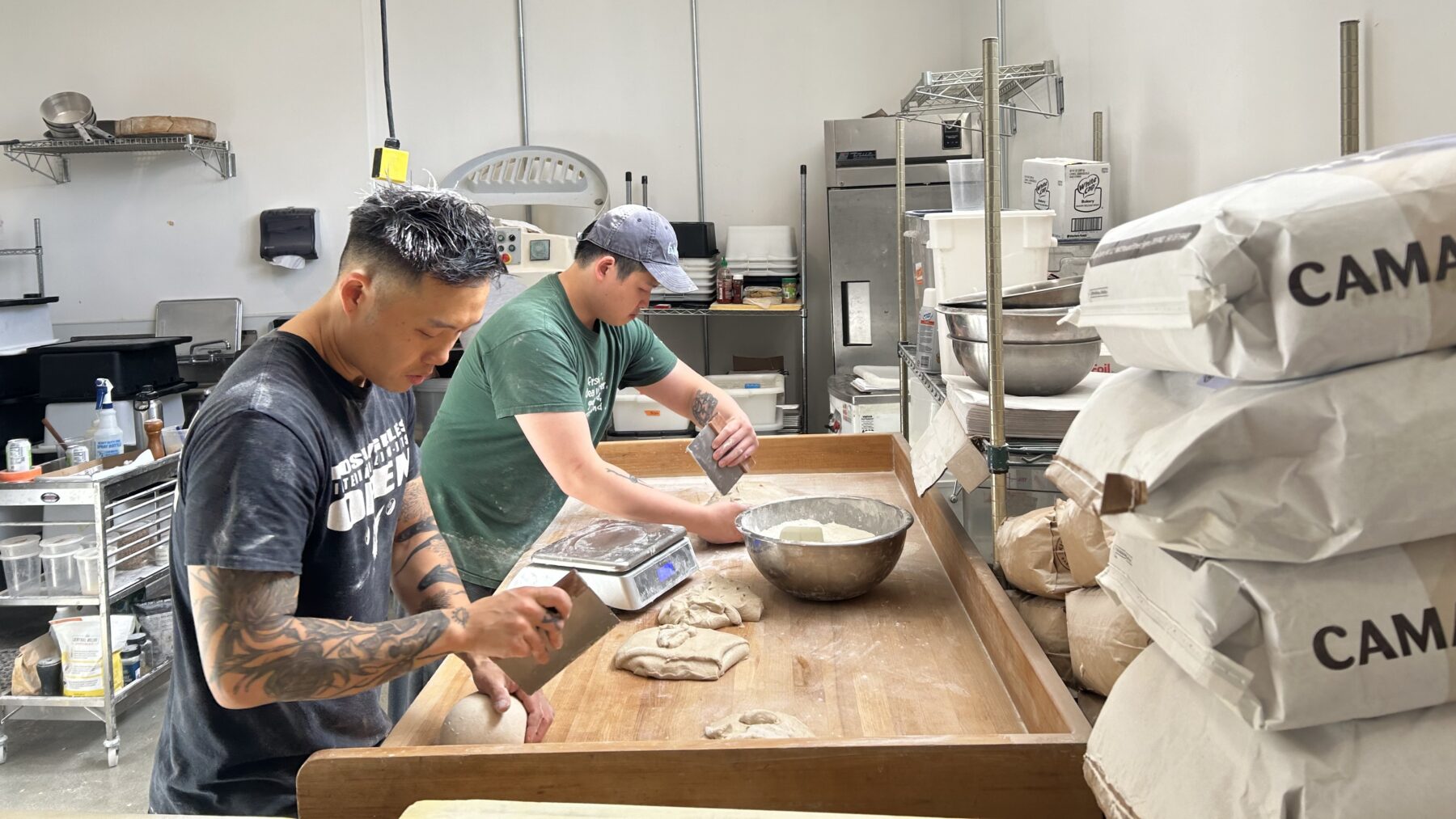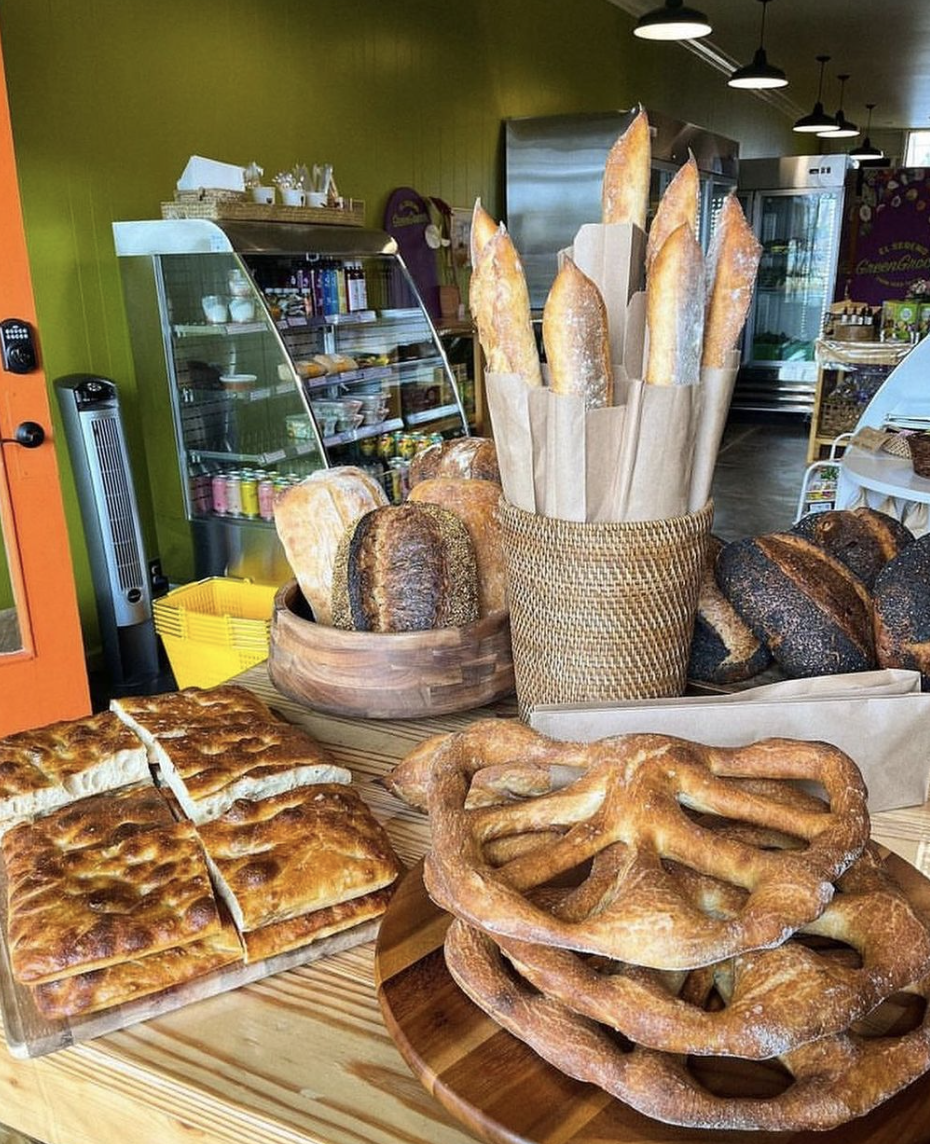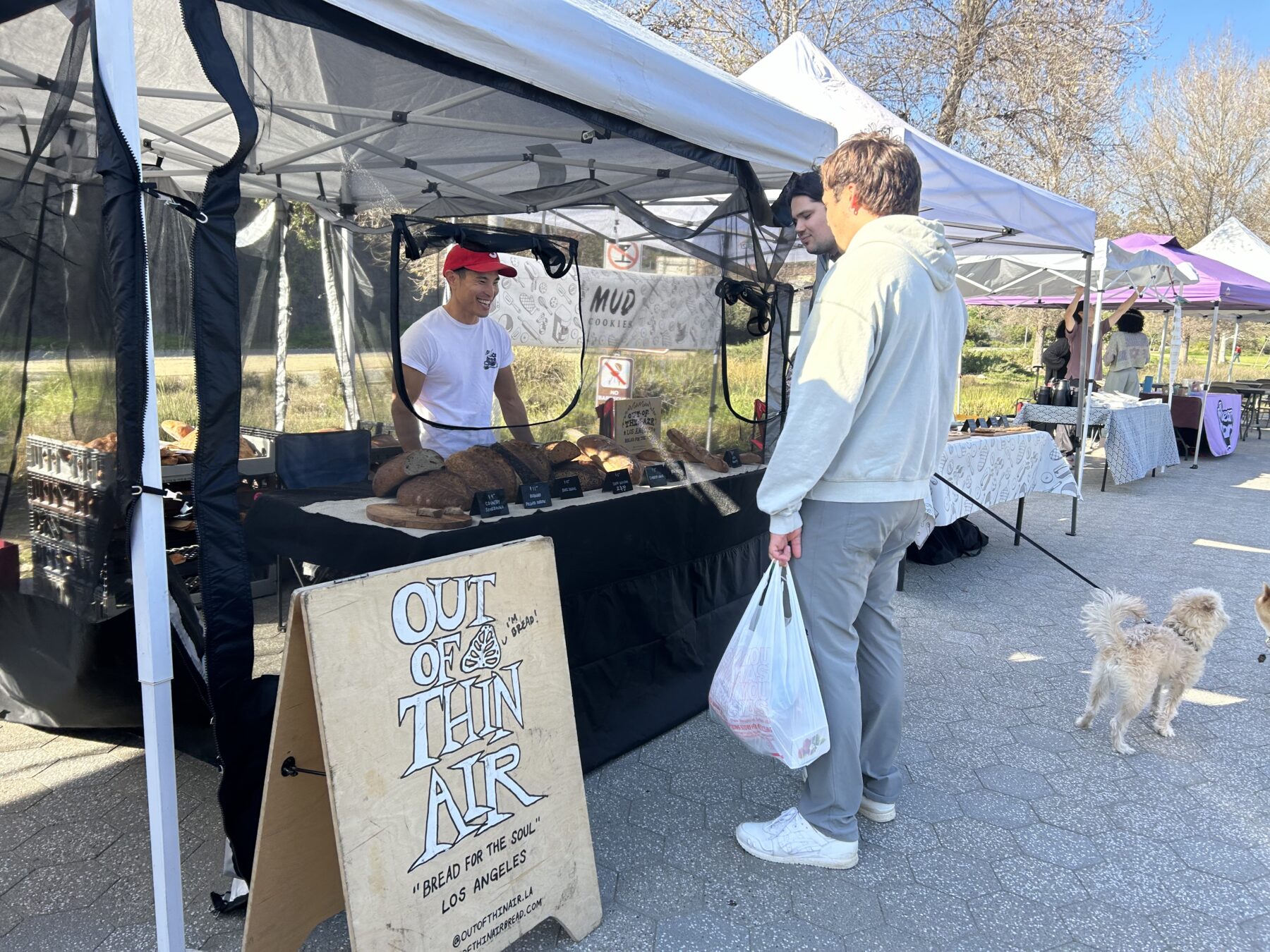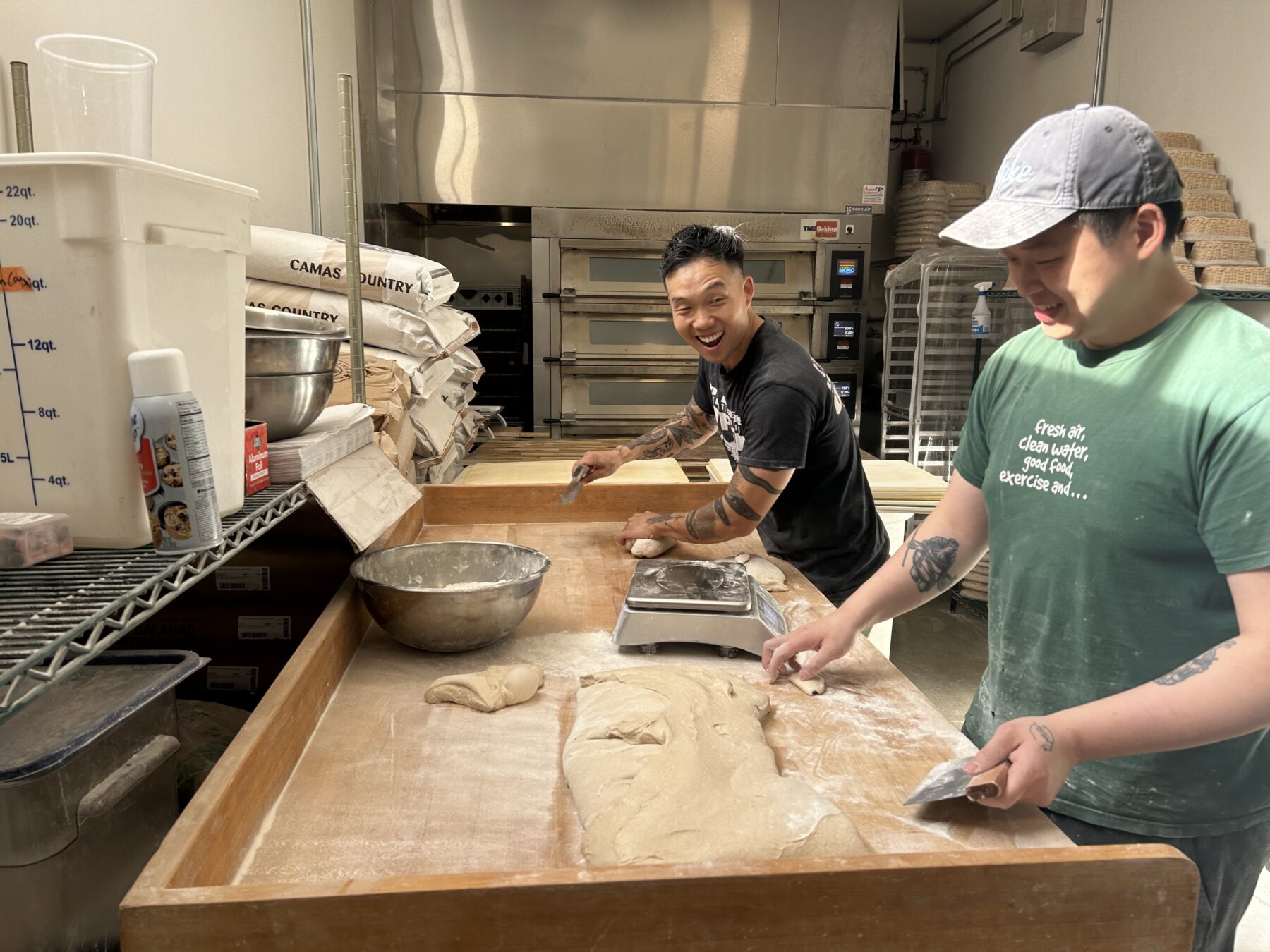
The first time Alessandro Jang held sourdough starter in his hands, he had no idea he would end up baking more than 300 loaves of bread over the next year.
“I know I have an addictive personality,” said Jang, 33. “I was hooked once I found out that there’s a whole world behind baking good bread.”
Jang, who’s in recovery from heroin addiction, had just left Nanoom Christian Fellowship, a rehab center in Los Angeles’ Koreatown, right before the world went into a pandemic lockdown in early 2020. He moved in with his mom, completed his GED and started working at a nearby coffeeshop in Granada Hills. It was there that he was given his first sourdough starter by a friend.
That day, he went home with it in a deli cup and baked his first loaf. He loved the challenge of baking the perfect sourdough — a dark crust with a light interior. Once the cafe said he could start selling his home-baked bread, he stayed up every night to bake 10 loaves in his mother’s oven.
“My bread was terrible,” he said. “People were just being nice. But that belief that someone wanted my bread was what gave me the rush to keep baking. I will always feel grateful to my first customers who believed in me.”

Jang was determined to train under the best bakers he could find in Los Angeles. During the next two years, he jumped from Clark Street to Bub and Grandma’s, two of the most famous bakeries in the city. It was helpful that he could communicate with his Spanish-speaking co-workers, having grown up in Buenos Aires.
Once he became more confident about the quality of his bread, he converted his living room into a kitchen and launched Out of Thin Air. The small bakery business debuted as a pop-up stand in front of a stationery store in Chinatown in November 2021.
Out of Thin Air has since moved its operations into a commercial kitchen and sells bread to over 30 accounts across restaurants, hotels and farmers markets. He also employs five full-time employees, two of whom are also in recovery. Jang said the name Out of Thin Air was inspired by “Cooked,” a Netflix documentary featuring the food writer Michael Pollan.
“It showed me that you take three ingredients that aren’t nutritious on their own — water, flour and salt — and you leave it up to time and nature to create something nutritious,” he said. “It’s almost like the bread comes straight out of thin air. It’s how I feel about my life, my business and my employees.”
A transitional career program for those in recovery
According to the National Institutes of Health, around 1 in 10 adults in the United States has struggled with drug use disorder. Of those 23 million adults, around 75% were either in treatment or in the post-recovery phase in 2018; 40% to 60% of those in recovery are expected to relapse.
A 2017 study found that 94% of people in a substance abuse treatment facility believed that job and housing stability would facilitate an effective transition from residential treatment to the community. It also found that employment advocacy for people with a history of substance abuse, such as proactive outreach to potential employers and an assessment of employment barriers, could ”help broker employers’ resistance to hire” and create a path for legitimate work opportunities.

Jang agrees that the missing step for those in recovery is often a transition period to learn how to be a functioning member of society. “There is no in-between. You’re in the rehab center, and then you’re out, and you’re supposed to make a living immediately,” he said.
While sober living homes are an option for people completing treatment, only 1% of adults in recovery choose to go into a home after being discharged. Finding a high-quality sober living home can prove difficult: There is no organized database of these residential centers, and the absence of regulations can lead to differences in the care people receive.
Over time, Jang realized that his calling was not only to make good bread but also to start a business that could employ people from rehab centers. His first hire was Anthony Kang, who is also in recovery from heroin addiction and had been living at Nanoom at the time. “I met Alessandro three years ago because he would periodically stop by to volunteer. He took a big chance on me and hired me,” Kang said.
Kang spoke candidly about how difficult the recovery process can be. At Nanoom, he said, he saw people go through the motions of recovery, unsure if it would stick. “There can be hopelessness among addicts. People can get stuck in these cycles that are hard to get out of,” he said. “As addicts, we’re never really out of the woods.”
By working for Out of Thin Air while still at the rehab center, Kang was able to adjust to a more structured schedule. Once he checked out of Nanoom, he was already used to arriving at the bakery at 7 a.m. and working 10-hour days.
Kang said his greatest challenge was being exposed to the outside world again. “Rehab centers can be a tiny bubble because you see the same faces every day. When you’re separated from society, you forget how to socialize, how to communicate with others, and how to behave generally,” he said. “It was really jarring at first stepping back into it.”
Baking can be a powerful practice of mindfulness
Jack Hazan, a therapist and author of “Mind Over Batter: 75 Recipes for Baking as Therapy,” described the power of baking for therapeutic purposes and the resilience it can build for recovery. “Baking is a form of self-care,” Hazan said. “You’re creating something that you can feel good about.”

Hazan will use baking as an icebreaker with new patients to tap into their emotions. Because they’re using their hands, it’s a form of meditation for his clients and a mindfulness-based approach that makes therapy feel fun. He frequently brings people together for baking therapy sessions, encouraging couples or parents with their children to co-create and connect through baking.
Hazan has worked with several people in recovery throughout his seven years of practice. He said that spaces like Out of Thin Air help because they foster community. “Addicts need connection,” he said. “Through this bakery, they have to commit to something they’re not going to be perfect at. But if they can stay committed and maintain that discipline, that’s what’s important.”
On most days, Jang and his employees arrive at the kitchen by 2 or 3 a.m. to check in on how the sourdough has proofed, or risen, overnight. They feed the starter with hot water, then wait for it to double in size. While they wait, they divide the other dough into batches, weigh it out and shape it into loaves of baguettes and ciabatta. They bake for eight hours straight, and then prepare the mix for the next day. Around 8 a.m., Jang and a full-time driver head out to deliver around 200 loaves throughout the city.
Baking sourdough is a two-day process that brings a lot of uncertainty to Jang. It means relinquishing control over perfection and paying attention to what the sourdough needs. “An important factor is figuring out what temperature the water should be. If it’s been colder or warmer than usual, and the dough has been moving really slowly, the baker’s job is to use their intuition,” he said. “Baking sourdough taught me that I needed time, technique and patience.”
Out of Thin Air’s most popular product is its gochujang sourdough, which is fermented with Korean red chili paste, green onions and roasted garlic. “Customers will follow us around from market to market to pick up our gochujang sourdough,” Kang said. “I had no idea that people could be this passionate about bread.”
Jang hopes that the intention and love he pours into baking can be delivered to customers through the bread. He believes there are much better bakers in LA, but now when he comes across them, he hopes to bring them onto the team he’s building. “It’s not all about the bread,” he said. “It’s like eating your mother’s cooking. You’re not eating just her food. You can taste that love, and you can consume that intention.”


